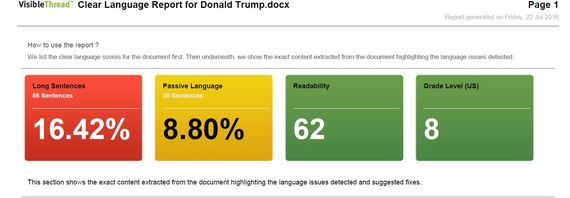The tech-savvy (except Peter Thiel) have shown no love for the newly announced Republican candidate throughout the nominating process. I figured it was time to look at Trump's speech in the tech world's own lingo -- algorithms. So, I called Fergal McGovern who runs a company called VisibleThread. The company analyzes documents much like tools that analyze data. The company's software is used to test and audit written content for risk and content quality, with customers including Boeing, Intel, Accenture and Fannie Mae. We asked VisibleThread to look at the usage of certain terms (say Hillary or Make America) and to look at overall readability.
Trump scores a speech that is ranked at the 8th-grade reading level overall. Trump's speech used lots of passive voice, which, according to McGovern is often used by politicians to avoid attribution. "Mistakes were made" is a good example of this. Long sentences with passive voice like the ones below were frequent:
At this moment, I would like to thank the evangelical and religious community because I'll tell you what, the support they have given me, and I'm not sure I totally deserve it has been so amazing and has had such a big reason for me being here tonight. So true. They have so much to contribute to our politics, yet our laws prevent you from speaking your minds from your own pulpits. An amendment, pushed by Lyndon Johnson, many years ago, threatens religious institutions with a loss of their tax-exempt status if they openly advocate their political views. Their voice has been taken away.
As for content, we flagged certain words in the transcript. Not counting the shouts of the audience, Hillary was mentioned 11 times in the speech, followed by terrorism with 9 mentions.
The word America ruled the evening being used 24 times with descriptors including:
America First
America first!
America fist
America Great
America Proud
America Safe
America Strong
Following the use of America, "our country" and "people" were the second most used terms with a variety of qualifiers -- rich people, working people, young people, innocent people. Trade -- bad trade agreements, disastrous trade deals, our horrible and unfair trade deals, trade violations -- was never talked about in a positive light. The contextual words surrounding immigrants included illegal, recent, security, unlawful migration, radical, dangerous and uncontrolled.
Other concepts discussed included Islamic in the context of "radicals" and "terrorists." Work, another frequent theme, was modified by terms like laid off, factory and steel.
There'll be lots of analysis of this speech, and from the looks of it, humans still add an insight that word analytics programs can't. Based on the most frequently words used, you'd be hard pressed to call this speech uplifting, but in terms of data analysis it's pretty pro forma long sentence, passive voice politics.
Other points of interest? Giuliani spoke at a Grade 5 reading level while Melania upped that to 7th grade. She used longer sentences and less passive voice.
Stay tuned for Hillary Clinton's analysis next week.
Robin Raskin is founder of Living in Digital Times (LIDT), a team of technophiles who bring together top experts and the latest innovations that intersect lifestyle and technology. LIDT produces conferences and expos at CES and throughout the year focusing on how technology enhances every aspect of our lives through the eyes of today's digital consumer.

